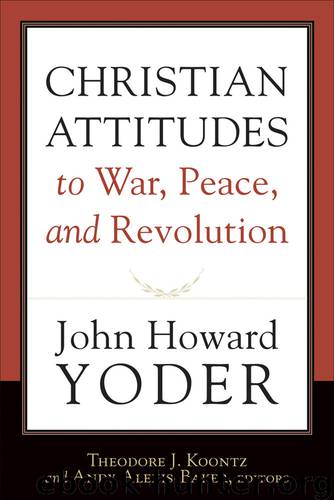Christian Attitudes to War, Peace, and Revolution by John Howard Yoder Theodore J. Koontz Andy Alexis-Baker

Author:John Howard Yoder, Theodore J. Koontz, Andy Alexis-Baker [John Howard Yoder, Theodore J. Koontz, Andy Alexis-Baker]
Language: eng
Format: epub
Tags: REL067000, REL067070, REL067000
Publisher: Baker Publishing Group
Published: 2013-05-28T16:00:00+00:00
Pacifism in the Nineteenth Century
Part of the pacifist story in the nineteenth century is a stream within mainstream Protestant denominations. In 1815 businessman David Dodge founded the New York Peace Society.[1] Founding a society was a new way to address a concern. America had seen an enormous proliferation of denominations separated by traditional issues such as infant baptism, specific doctrines, or views of the sacraments. When a new issue arose, these American Protestants did not expect the old denominations to become the vehicle of that new concern. So for the purpose of addressing that issue, someone would create an agency, which did not call itself a church. To address two purposes, they created two societies, which would have different constituencies. Dodge created a peace society with the sole purpose of propagating a peace message. Other people created a society to promote Sunday schools, another for the abolition of slavery, and another to oppose child labor. For every cause they created a society.
We forget that the idea of forming such free associations was new in the nineteenth century. This development raised new problems for the unity of the church, the unity of Christian witness, and the accountability of Christian social impact. What does it mean if every time Christians get together to do something, they have to create a new organization around their new commonality, leaving behind the people who are not in agreement with that new commonality? These societies in the nineteenth century fragmented the institutional church even further.
The pacifism of the societies
David Dodge’s younger colleague Adin Ballou (1803–90) might have been the first person to use the term nonresistance as a label.[2] The word is drawn straight out of Jesus’s words. These urban, prosperous, white Protestants in the first half of the nineteenth century were literal about Jesus’s words, and about doing what Jesus said, without asking questions about social theory or practicability. Their idea was to do what Jesus said simply because he had said it. The idea was to set up an organization to tell people about nonresistance. If others did not agree, then those who differed would have to talk about their differences.
Now those who espouse nonresistance have been trained to think that a nonresistant stance is sectarian, anticultural, and naive, and that we have to argue on another level. In contrast, these cultured and articulate people (today not many businessmen write books that sell well) put their point simply: “Jesus says this, so we ought to do it.” They did not argue that it made sense, describe how it would work, or try to determine whether they could save the world or even run the country. There was a widespread feeling that the War of 1812 had been a bad, unnecessary war. Maybe people had begun to doubt whether it was good to massacre American Indians on the frontier. They may have had a sense that the Napoleonic wars in Europe had been destructive beyond all rationality. In short, maybe behind this focus on nonresistance was some wider sense of cultural appropriateness.
Download
This site does not store any files on its server. We only index and link to content provided by other sites. Please contact the content providers to delete copyright contents if any and email us, we'll remove relevant links or contents immediately.
The Secret Power of Speaking God's Word by Joyce Meyer(3223)
Signature in the Cell: DNA and the Evidence for Intelligent Design by Stephen C. Meyer(3138)
Real Sex by Lauren F. Winner(3024)
The Holy Spirit by Billy Graham(2953)
The Gnostic Gospels by Pagels Elaine(2532)
Jesus by Paul Johnson(2363)
Devil, The by Almond Philip C(2333)
23:27 by H. L. Roberts(2252)
The Nativity by Geza Vermes(2233)
Chosen by God by R. C. Sproul(2165)
All Things New by John Eldredge(2162)
Angels of God: The Bible, the Church and the Heavenly Hosts by Mike Aquilina(1969)
The Return of the Gods by Erich von Daniken(1946)
Angels by Billy Graham(1926)
Knowing God by J.I. Packer(1860)
Jesus of Nazareth by Joseph Ratzinger(1811)
The Gnostic Gospel of St. Thomas by Tau Malachi(1799)
Evidence of the Afterlife by Jeffrey Long(1791)
How To Be Born Again by Billy Graham(1782)
